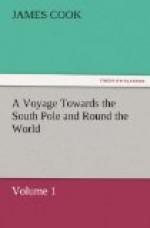their stern to the sea; the admiral’s vessel
being nearly in the centre. Besides the vessels
of war, there were an hundred and seventy sail of smaller
double canoes, all with a little house upon them,
and rigged with mast and sail, which the war canoes
had not. These, we judged, were designed for
transports, victuallers, &c.; for in the war-canoes
was no sort of provisions whatever. In these
three hundred and thirty vessels, I guessed there
were no less than seven thousand seven hundred and
sixty men; a number which appears incredible, especially
as we were told they all belonged to the districts
of Attahourou and Ahopatea. In this computation
I allow to each war canoe forty men, troops and rowers,
and to each of the small canoes eight. Most of
the gentlemen who were with me, thought the number
of men belonging to the war canoes exceeded this.
It is certain that the most of them were fitted to
row with more paddles than I have allowed them men;
but, at this time, I think they were not complete.
Tupia informed us, when I was first here, that the
whole island raised only between six and seven thousand
men; but we now saw two districts only raise that
number; so that he must have taken his account from
some old establishment; or else he only meant
Tatatous,
that is warriors, or men trained from their infancy
to arms, and did not include the rowers, and those
necessary to navigate the other vessels. I should
think he only spoke of this number as the standing
troops or militia of the island, and not their whole
force. This point I shall leave to be discussed
in another place, and return to the subject.
After we had well viewed this fleet, I wanted much
to have seen the admiral, to have gone with him on
board the war-canoes. We enquired for him as
we rowed past the fleet to no purpose. We put
ashore and enquired; but the noise and crowd was so
great that no one attended to what we said. At
last Tee came and whispered us in the ear, that Otoo
was gone to Matavai, advising us to return thither,
and not to land where we were. We accordingly
proceeded for the ship; and this intelligence and advice
received from Tee, gave rise to new conjectures.
In short, we concluded that this Towha was some powerful
disaffected chief, who was upon the point of making
war against his sovereign; for we could not imagine
Otoo had any other reason for leaving Oparree in the
manner he did.
We had not been long gone from Oparree, before the
whole fleet was in motion to the westward, from whence
it came. When we got to Matavai, our friends
there told us, that this fleet was part of the armament
intended to go against Eimea, whose chief had thrown
off the yoke of Otaheite, and assumed an independency.
We were likewise informed that Otoo neither was nor
had been at Matavai; so that we were still at a loss
to know why he fled from Oparree. This occasioned
another trip thither in the afternoon, where we found
him, and now understood that the reason of his not




